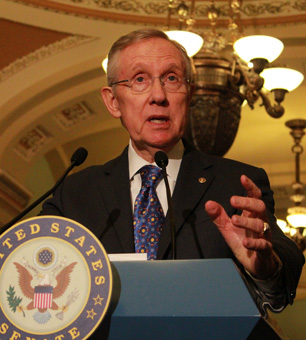 Senate Majority Leader Harry Reid. (Photo: Talk Radio News Service / Flickr)Reformers frustrated by gridlock in the Senate are hoping to see changes made to filibuster rules Friday when lawmakers can overhaul procedural rules on the first day of the new Congress.
Senate Majority Leader Harry Reid. (Photo: Talk Radio News Service / Flickr)Reformers frustrated by gridlock in the Senate are hoping to see changes made to filibuster rules Friday when lawmakers can overhaul procedural rules on the first day of the new Congress.
Two major proposals are currently on the table, but Senate Majority Leader Harry Reid (D-Nevada) is now expected to use a technical procedure that could delay a vote on new filibuster rules until as late as January 22, according to published reports.
Frustrated by frequent use of the filibuster by Republicans, Reid had threatened to use the so-called “nuclear option” and change filibuster rules with a simple majority vote rather a supermajority; but it appears the majority leader wants more time to negotiate with Republicans and may want to avoid setting a precedent that could cause trouble for future Democrats if they become the Senate minority.
Sen. Jeff Merkley (D-Oregon) notes in a recent op-ed that Reid has faced 386 filibusters in the past six years and it is “amazing” that any legislation has passed the Senate. Merkley, along with Sen. Tom Udall (D-New Mexico) and other Democrats have proposed rule changes that would limit the number of filibusters in the Senate and replace the “silent filibuster” with the “talking filibuster.”
Many Americans are familiar with “talking filibusters”: A lawmaker blocks legislation by extending debate and may take the floor to continue the debate for long periods of time if necessary. At least 60 Senators must vote to end a filibuster.
Under current rules, lawmakers can simply use the “silent filibuster” to keep debate open without taking the floor.
“It puts you on record before your colleagues, and it puts you on record with the American people,” Merkley said of the “talking filibuster” in a recent video statement.
Last week, Michigan Democrat Sen. Carl Levin joined Republican Sen. John McCain and others in introducing a counterproposal. The Levin-McCain proposal may enjoy bipartisan support, but reformers say it is as weaker than the Merkley’s.
The Levin-McCain proposal would block filibusters on proceeding to debate and would guarantee that the minority party could introduce at least two amendments on the floor. The proposal would not make the “talking filibuster” a requirement, but instead asks party leaders not to honor filibuster threats unless a lawmaker will actively take the floor to debate.
The proposal quickly came under fire from a coalition of progressive groups that said “thanks, but no thanks” to McCain and Levin.
“The Levin-McCain proposal would do far too little to restore functionality to the Senate,” said Michael Waldman, president of the Brennan Center for Justice. “We have seen over the past two years that handshake agreements cannot curb abuse of the rules.”
A recent poll by Public Policy Polling shows that 70 percent of Americans in 10 states say lawmakers should use the “talking filibuster.”
Join us in defending the truth before it’s too late
The future of independent journalism is uncertain, and the consequences of losing it are too grave to ignore. To ensure Truthout remains safe, strong, and free, we need to raise $44,000 in the next 6 days. Every dollar raised goes directly toward the costs of producing news you can trust.
Please give what you can — because by supporting us with a tax-deductible donation, you’re not just preserving a source of news, you’re helping to safeguard what’s left of our democracy.